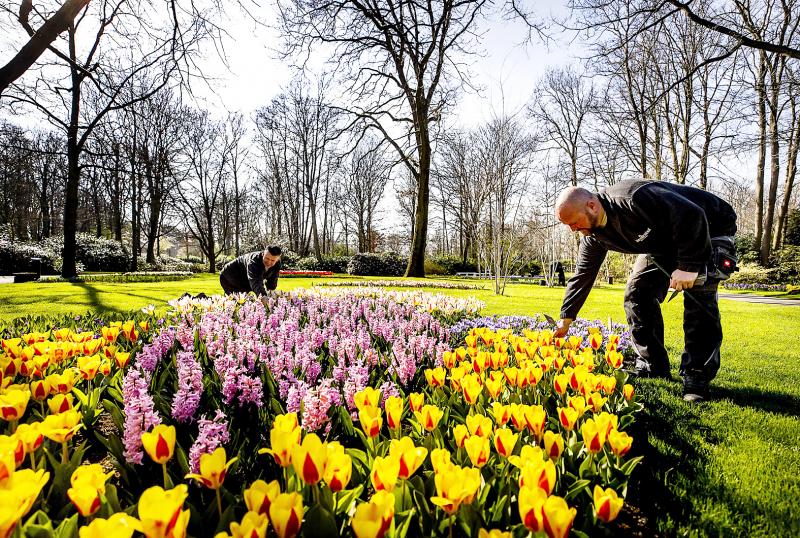COVID-19 is again surging in Western Europe due to a “perfect storm” of governments lifting restrictions, waning immunity and the more contagious BA.2 Omicron subvariant of SARS-CoV-2, experts said on Monday.
After more than a month of falling cases across much of the continent, nations such as France, Germany and Italy have all seen a dramatic resurgence of infections.
In France, cases have risen by more than one-third in the week since the government ended most restrictions on Monday last week.

Photo: EPA-EFE
In Germany, despite a new daily record of nearly 300,000 infections on Friday, the government let national legislation enabling disease prevention measures expire over the weekend.
However, most German states, which have considerable leeway on applying measures, have maintained their restrictions.
In Italy, the government announced on Thursday that it would phase out almost all restrictions by May 1 despite rising cases.
In the UK, where one in 20 people are infected, the government removed the last of its international travel restrictions on Friday.
Faced with its own surging cases, Austria announced on the weekend that it would reimpose rules requiring people to wear masks — just weeks after lifting the measure.
While some have blamed governments for relaxing restrictions too quickly, epidemiologists also pointed the finger at the BA.2 Omicron subvariant, which has become dominant in many nations.
Sometimes called “stealth Omicron” because it is more difficult to detect, BA.2 is estimated to be about 30 percent more contagious than its predecessor BA.1.
Lawrence Young, a virologist at the University of Warwick in England, said that rising cases in Europe were due to a combination — “a perfect storm” — of three factors: the lifting of restrictions, waning immunity after vaccination and BA.2.
“Removing restrictions has fueled the spread of BA.2 and could also lead to the generation of other variants,” Young said.
University of Geneva Institute of Global Health director Antoine Flahault said there were “a couple of hypotheses on the table, which are not mutually exclusive.”
He said that BA.2 was “clearly a relevant suspect in explaining the current rebound,” also mentioning waning immunity and the easing of disease prevention measures.
He also pointed to air pollution in western Europe during the infection resurgence, referring to research that showed “strong correlation” between COVID-19 outbreaks and high levels of fine particulate matter in the air.
Simon Clarke, cellular microbiology professor at the University of Reading in England, said that despite soaring cases in the UK, “concern about the virus among the public seems to be at an all-time low since the start of the pandemic.”
“The BA.2 version of Omicron seems to be behind this uptick in infections, which again shows how quickly the situation can change as the virus evolves into new forms,” Clarke told the Science Media Centre.

A fire caused by a burst gas pipe yesterday spread to several homes and sent a fireball soaring into the sky outside Malaysia’s largest city, injuring more than 100 people. The towering inferno near a gas station in Putra Heights outside Kuala Lumpur was visible for kilometers and lasted for several hours. It happened during a public holiday as Muslims, who are the majority in Malaysia, celebrate the second day of Eid al-Fitr. National oil company Petronas said the fire started at one of its gas pipelines at 8:10am and the affected pipeline was later isolated. Disaster management officials said shutting the

US Vice President J.D. Vance on Friday accused Denmark of not having done enough to protect Greenland, when he visited the strategically placed and resource-rich Danish territory coveted by US President Donald Trump. Vance made his comment during a trip to the Pituffik Space Base in northwestern Greenland, a visit viewed by Copenhagen and Nuuk as a provocation. “Our message to Denmark is very simple: You have not done a good job by the people of Greenland,” Vance told a news conference. “You have under-invested in the people of Greenland, and you have under-invested in the security architecture of this

UNREST: The authorities in Turkey arrested 13 Turkish journalists in five days, deported a BBC correspondent and on Thursday arrested a reporter from Sweden Waving flags and chanting slogans, many hundreds of thousands of anti-government demonstrators on Saturday rallied in Istanbul, Turkey, in defence of democracy after the arrest of Istanbul Mayor Ekrem Imamoglu which sparked Turkey’s worst street unrest in more than a decade. Under a cloudless blue sky, vast crowds gathered in Maltepe on the Asian side of Turkey’s biggest city on the eve of the Eid al-Fitr celebration which started yesterday, marking the end of Ramadan. Ozgur Ozel, chairman of the main opposition Republican People’s Party (CHP), which organized the rally, said there were 2.2 million people in the crowd, but

JOINT EFFORTS: The three countries have been strengthening an alliance and pressing efforts to bolster deterrence against Beijing’s assertiveness in the South China Sea The US, Japan and the Philippines on Friday staged joint naval drills to boost crisis readiness off a disputed South China Sea shoal as a Chinese military ship kept watch from a distance. The Chinese frigate attempted to get closer to the waters, where the warships and aircraft from the three allied countries were undertaking maneuvers off the Scarborough Shoal — also known as Huangyan Island (黃岩島) and claimed by Taiwan and China — in an unsettling moment but it was warned by a Philippine frigate by radio and kept away. “There was a time when they attempted to maneuver